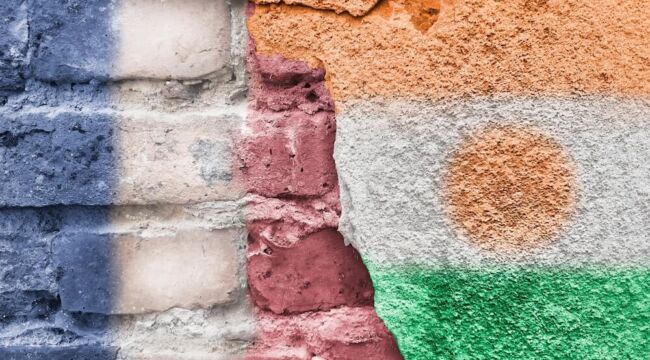The Frightening Fall of the F*cking French
Happy Thursday from a lovely Il Piemonte.
I use Il Piemonte more often now because Piedmont is French for saying “the foothills.”
The French are accustomed to being disliked, and for good reason.
Take their AirBnBs, for example.
On my recent jaunt around Europe with my wife’s family, my dear sister-in-law booked us an exquisitely located apartment. Rue de Rivoli runs along the north side of the Louvre, so it was perfect for sightseeing.
Although the staircase to the second floor was perpendicular to the ground, I let that slide.
It wasn’t until I had to drop a deuce that I got angry.
This smooth-brained AirBnB owner decided to take one bathroom and split it into two.
There was room for a toilet in each. That’s it. This owner clearly forgot that a person is supposed to sit comfortably on the toilet.
I was in trouble from the moment I sat down.
I couldn’t “Johnny Bench” it. Yes, I like to manspread maximally on the throne.
No dice.
But the problem really happened when I tried to wipe myself.
As I leaned forward, I smashed my head into the bathroom door.
Quite the conundrum, and one that never happened to me before.
I’m not a gymnast. How was I going to do this?
Luckily, no one else was home. So, I opened the door, constructed some advanced toilet paper origami, and prepared myself for a game of three-wall Twister.
But buff my bottom, I did!
I’m sure it looked something like this:

And then, I hated the French just that little bit more.
But my incident is nothing like what Western and Central Africa have suffered under French rule.
Imagine your rich, domineering, sadistic mother-in-law stopping over to make a few changes… and never leaving!
If you’re wondering why Africans have had enough of the Frogs, wonder no more.
In this edition of the Morning Reckoning, we’ll examine why Africans don’t want the door hitting France in its effete ass on its way out.
A Bit of History…
French colonialism in Africa began in the 17th century with the establishment of trading posts in Senegal.
But it wasn’t until the 19th century, during the Scramble for Africa, that France began to colonize the continent actively.
By the end of that century, France had control over a vast empire in Africa, stretching from the Maghreb to the Congo River.

Map of Francophone Africa; Credit: The Exchange
The French colonial policy in Africa was based on assimilation. This meant the French intended to transform their African subjects into French citizens with the same rights and responsibilities.
However, assimilation never really worked. Africans were often excluded from the political process and denied access to education and other opportunities.
French rule in Africa was harsh and exploitative. The French extracted vast wealth from their colonies and often used forced labor. This led to widespread poverty and suffering among the African population.
There were many rebellions against French rule in Africa. The most famous of these was the Algerian War of Independence (1954-1962), which resulted in the withdrawal of French forces from Algeria.
The last French colony in Africa, Niger, gained independence in 1960. However, through economic and military cooperation – some might call it “coercion” – France has maintained close ties to many of its former colonies.
The Colonial Act
From 1900 until Niger’s independence, The Colonial Act was in effect. It was a significant source of resentment among Africans. It was seen as a way for France to exploit its colonies legally.
Here are the colonies’ obligations under the Colonial Act and some details about each of them:
- Paying taxes to France: African countries were required to pay taxes to France, even though they didn’t have representation in the French government. These taxes were used to fund the French colonial administration and military.
- Providing forced labor to France: African countries were required to provide forced labor to France, typically for public works projects. This labor was often unpaid or poorly paid, leading to widespread exploitation and abuse.
- Exporting their raw materials to France: African countries were required to ship their raw materials to France at prices often set by the French government. This meant that African countries didn’t benefit from the total value of their natural resources.
- Importing French goods: African countries were required to import French goods, even if these goods were more expensive than goods from other countries. This helped protect French businesses and ensure France maintained control of the African economy.
- Using the French franc as their currency: African countries were required to use the French franc as their currency. This made it difficult for them to control their economies and made them more reliant on France.
- Sending their children to French schools: African children were required to attend French schools, where they were taught French culture and values. This was seen as a way to assimilate Africans into French society and make them more loyal to France.
- Adopting French culture and values: African countries were encouraged to adopt French culture. This was seen to make them more civilized and compatible with France.
All of these are bad, but some are worse than others.
And while the Colonial Act no longer exists, at least one shocking legacy remains: the CFA franc.
No Monetary Policy For You!
As Nathan Rothschild may have commented, “I care not what puppet is placed upon the throne of England to rule the empire on which the sun never sets. The man who controls the British money supply controls the British Empire, and I control the British money supply.”
The conclusion is simple: if you want to control a country, control its currency.
France controls fourteen countries in Central and West Africa with the CFA franc.
CFA stands for Communauté Financière Africaine (African Financial Community).
The CFA franc was created in 1945, during the French colonial period, to tie the economies of these countries to the French franc.
It still exists and is pegged to the euro at a fixed rate of 1 euro = 655.957 CFA francs. This means that the value of the CFA franc is always the same as the value of the euro, regardless of what happens in the global economy.
And by extension, these African countries have no control over their country. Because if you don’t control your currency, you don’t control your country. Just ask Germany, France, Italy, Spain, or any other member of Euroland.
The West African Economic and Monetary Union (WAEMU) and the Central African Economic and Monetary Community (CEMAC) manage the CFA franc. These organizations are responsible for setting the exchange rate and ensuring the currency’s stability.
The CFA franc has been criticized for constraining African development in several ways.
First, the peg to the euro makes it damn near impossible for African countries to devalue their currencies in times of economic crisis. This makes it more difficult for them to export goods and services and attract foreign investment.
Second, the CFA franc is not freely convertible and cannot be freely traded on the open market. This makes it difficult for African businesses to operate internationally or get a credit line.
Third, the French government manages the CFA franc, not those African countries. This gives France control over the economies of the CFA franc countries. This control prevents these countries from developing their economies independently.
Wrap Up
As you well know, your money is essential.
It’s the medium of exchange you use every day. It’s the unit of account you use to measure value. It’s the store of value for most people to save their earnings.
When your government controls your money, it’s bad enough. But when foreigners control your money, you’re not free. It’s that simple.
The surprise isn’t that there’s a revolution going on in Africa.
The wonder is how it took so long to start.



Comments: